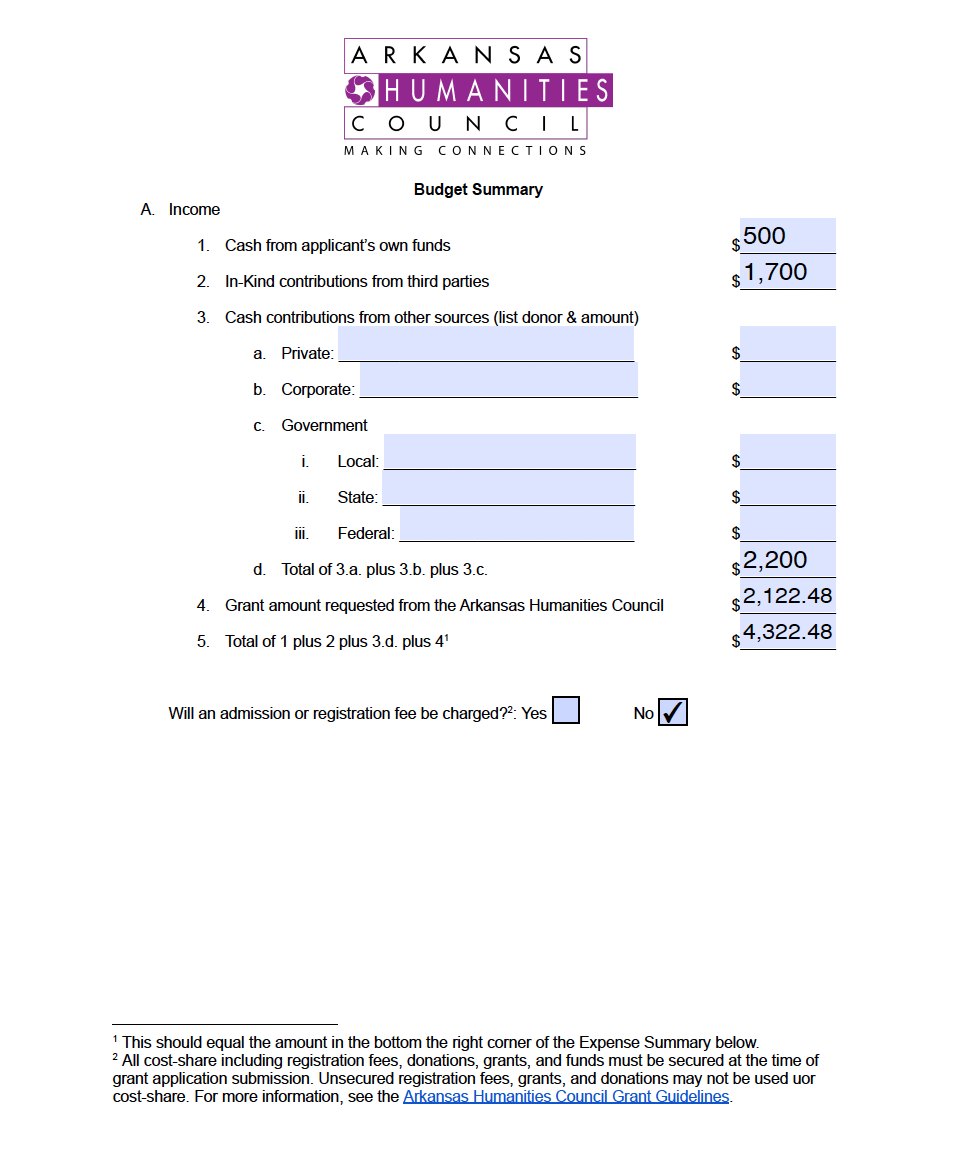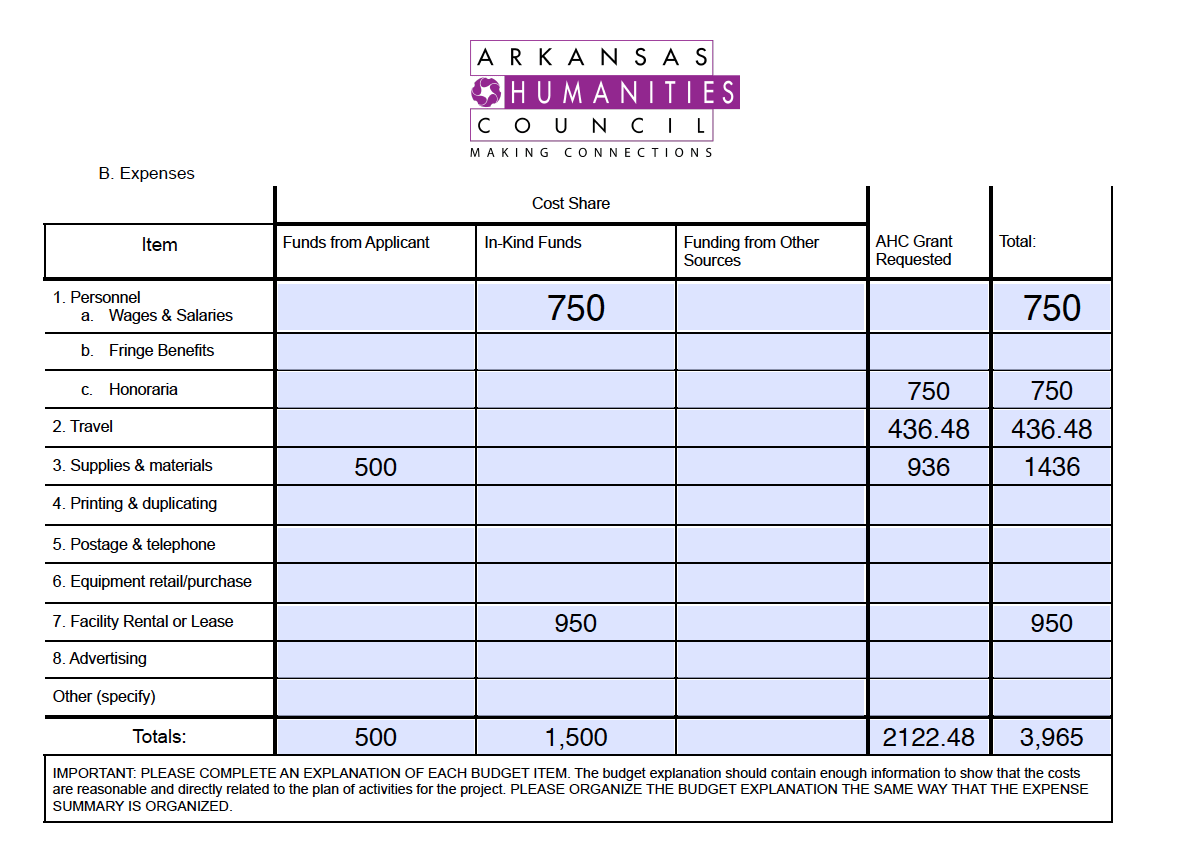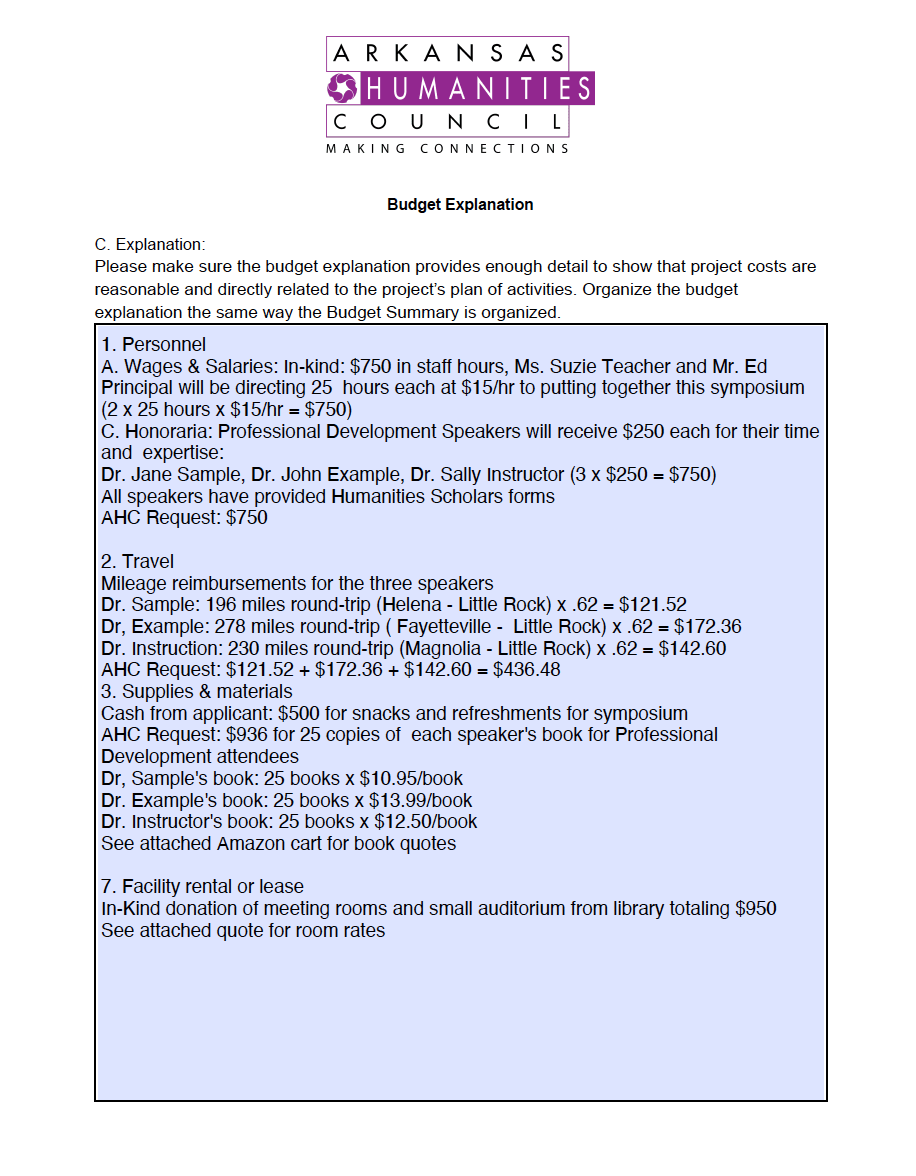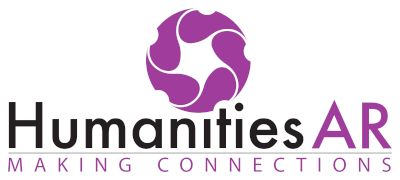Carefully preparing your grant application is important. This page provides guidance for completing the major sections of the grant application:
- Project Description
- Budget Summary and Narrative (including a description of cost share and a sample budget)
- Humanities Scholars
Project Description
The project description provides the “who, what, when, where, and why” of the proposed project. Clearly and concisely explain what will occur during the proposed grant period, how will funds be used, and the roles of project participants.
Budget Summary and Explanation
Your grant application will include a summary and narrative of the project budget that shows the project’s expected expenses and cost-sharing (if applicable). Be sure to include all cost-share including in-kind contributions, funding from other sources, cash from applicant, and HumanitiesAR grant request. The budget explanation should expand on the budget summary and match all cost-share and grant-requested amounts shown.
Important Note: HumanitiesAR provides fillable PDF forms for budget summaries and narratives across all federal assistance Grants processes. You must use these forms when applying for grants. If you don’t submit them, you may be asked to provide the proper paperwork or be denied due to non-compliance.
Budget Summary
The budget summary is a fillable form that states cash and in-kind cost-share contributions, as well as grant amount requested from HumanitiesAR. The totals for each of these items should match and add up to what is written in the budget explanation.
Budget Explanation
The budget explanation will include an itemized explanation of the totals listed in the budget summary, as well as a justification for the funds you’re requesting from HumanitiesAR.
When federal or state rates aren’t applicable, you must submit documentation to corroborate the amounts included in the budget. A few common examples of expenses that require documentation include supplies, books, printing, hotel rates, airfare, facility rentals, or contracted companies. The documentation should be itemized, accounting for items to be purchased, item price, and the number of items.
Cost Share
Cost-sharing (or matching) means that a portion of a project’s cost is not funded by federal funds. For Major and Mini Grants, cost-sharing is 50/50. This means HumanitiesAR grant funds may not account for more than half of the project’s total cost.
- You can use any combination of cash cost-share or in-kind cost-share, but all funds must be secured at the time of application.
- Cost-share may include cash from applicant, in-kind, and cash from other sources. Those other sources may be private, corporate, or government awards and/or donations (local, state, and/or federal). Grants received from other entities for the same project may be used as cost-share, but may not be used for identical expenses of the project.
- In-kind cost-share is the cash value of services, goods, and space donated to the project by third parties.
- All cost-share and expenses for a project must occur during the proposed grant period. Applicants may use any combination of cash cost-share and in-kind cost-share to meet grant application requirements.
- All cost-share, including registration fees, donations, grants, and funds, must be secured at the time of grant application submission.
- Unsecured registration fees, grants, and donations may not be used for cost-share.
- Grants that require cost-share:
- Major Grants
- Mini Grants
Examples of Common Expenses
- Travel
- Mileage reimbursement
- Must include the person(s) name to receive reimbursement, the purpose of the trip, the from and to locations, total roundtrip miles, cost per mile (HumanitiesAR will pay up to the current government rate per mile), and total amount.
- Airfare
- Must include the from and to locations, the purpose of the trip, name of the traveler, and cost of airfare for each person to receive reimbursement.
- Hotel accommodations
- Must provide the name(s) of the individual, number of nights, rate per night, and total amount.
- Applicants are encouraged to seek reasonable rates
- Personnel Costs
- Salary and wage expenditures
- May include the services of the project director, staff of the applicant organization, and other salaried or hourly wage participants.
- Salary and wage expenditures should not include services provided as a part of regularly assigned duties.
- The basis for salaries, wages, and fringe benefits must be explained in the Budget Narrative.
- Honoraria
- Organizations requesting funds for speaker fees and/or honoraria will be allowed up to a maximum of $1,000 per speaker. The fact that a speaker is widely recognized and considered to be important is not in and of itself justification for an increase in the honoraria for a single event. The total cost for multiple speakers will not exceed $5,000 per proposal.
- Salary and wage expenditures
- Mileage reimbursement
- Supplies and Materials
- Must include unit, unit cost, number of units, and shipping costs if applicable for each item
- Printing
- When requesting funds for printing costs, the cost may not exceed 25% of the proposal’s overall budget.
- Must include quotes for price of printing in the Budget Narrative.
- Equipment Rental or Purchase
- Up to $1,000 in grant funds may be applied to the purchase of equipment with useful lives longer than the proposed grant period, such as a camera, tape recorder, computer, printer, and/or similar device. Justification for the purchase or rental of equipment must accompany the grant application and be included in the Budget Narrative.
- The applicant must show that the purchase price is less than the rental price of the items for the length of the proposed grant period.
- The applicant should explain the plan for use of purchased equipment after the project is completed.
For more information about eligible/ineligible expenses, feel free to contact us.
Sample Grant Budget Summary and Explanation
In the fictional example—provided here for demonstration purposes only—the applicant, Ms. Suzie Teacher, is applying for a grant to host a professional development symposium in Little Rock. Suzie will bring in three speakers and supply their books to symposium attendees. She is requesting funds to pay honoraria to the speakers, reimburse mileage for their trips to Little Rock, and purchase the books to distribute at the event.
This example demonstrates how to fill out budget forms to satisfy our requirements. As a reminder, you must submit all budget summaries and explanations using our fillable PDF forms (seen in this example). If you don’t use these forms, you may be asked to resubmit with the proper paperwork or be denied due to noncompliance.
NOTE: This example includes the use of cost-share. If you’re applying for a grant that doesn’t have a cost-share requirement, you can still follow this same example but leave blank the “Cash from Applicant” and “In-Kind” sections.



Important note: In this explanation, Suzie adds “See attached” to indicate accompanying cost estimates and quotes. These will be corroborating documentation about her project’s planned expenses because federal and state rates don’t apply to them.
Humanities Scholars
To receive federal grant funds from HumanitiesAR, your project must include at least one humanities scholar who is involved in the planning, implementation, and evaluation of the project. The humanities scholar cannot also serve as the project director on the grant.
It is recommended that a project’s principal humanities scholar(s) should be from outside the applicant organization. A person from within the organization may serve, but they may only be noted as a consultant or as an additional/secondary humanities scholar.
Humanities scholars are individuals who have expertise in a particular field of study that pertain to the humanities. Most often, humanities scholars have master’s or doctoral degrees and are employed by colleges, universities, museums, historical societies, education cooperatives, elementary and secondary schools, libraries, and other similar organizations and institutions.
Some humanities scholars of non-traditional means have expertise in local community history or in historical events through first-hand knowledge and are recognized by other scholars as authorities in a particular humanities field of study.
Grants that require humanities scholars:
- Major Grants
- Mini Grants
- Black History and Culture Grants
- Access to the Humanities Grants
- REACH Grants (Classroom Projects)
Grants that don’t require humanities scholars:
- REACH Grants (Professional Development)
- Arkansas State Park Field Trip Grants
- Helen T. Leigh Museum Field Trip Grants

